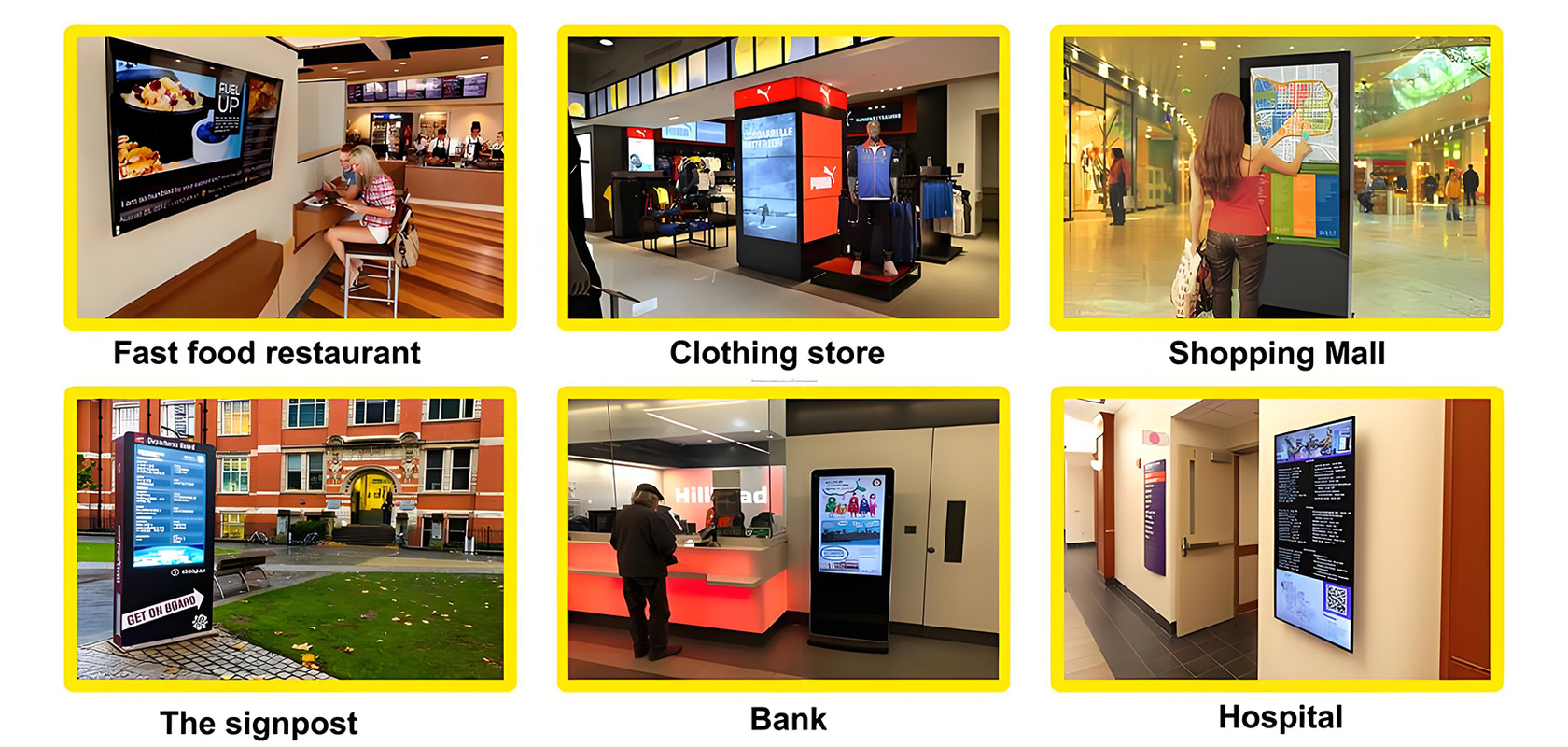Digital Signage for Wedding Venues
Digital Signage for Wedding Venues.In the realm of modern wedding planning, every detail counts. From the floral arrangements to the lighting design, each element is meticulously chosen to create an unforgettable experience for the couple and their guests. Amidst this quest for perfection, digital signage has emerged as a versatile and innovative tool that enhances the ambiance, streamlines communication, and adds a touch of sophistication to wedding venues. This article delves into the myriad ways digital signage can transform wedding venues, exploring its benefits, applications, and the future of this technology in the wedding industry.

The Evolution of Wedding Venue Communication
Traditionally, wedding venues relied on static signage—such as printed directional signs, menus, and welcome boards—to guide guests and provide necessary information. While these methods were functional, they lacked the dynamism and interactivity that modern couples and their tech-savvy guests now expect. The advent of digital signage has revolutionized this landscape, offering a more engaging and flexible means of communication.
Digital signage refers to electronically displayed content that can be easily updated and customized. It encompasses a wide range of formats, including LCD and LED screens, interactive kiosks, and projection systems. By integrating digital signage into wedding venues, planners can create immersive experiences that captivate guests and elevate the overall aesthetic of the event.
Benefits of Digital Signage for Wedding Venues
1. Enhanced Guest Experience
Digital signage enhances the guest experience by providing real-time information and interactive features. For instance, digital welcome boards can display dynamic messages, showcasing the couple's love story or highlighting key events throughout the day. Interactive kiosks can offer guests the ability to browse the wedding program, view photos from the couple's photo booth, or even participate in fun quizzes and polls.
Moreover, digital wayfinding signs can guide guests through the venue, eliminating the need for printed maps and reducing confusion. These signs can be updated in real-time to reflect changes in the schedule or last-minute additions to the venue layout.
2. Customization and Personalization
One of the key advantages of digital signage is its ability to be customized and personalized to suit the couple's preferences. From the color scheme to the font style, every aspect of the digital content can be tailored to match the wedding's theme and ambiance. This level of customization ensures that the digital signage complements the overall aesthetic of the venue, creating a cohesive and visually appealing experience.
Furthermore, digital signage can be used to display personalized messages and graphics that resonate with the couple and their guests. For example, a digital screen could showcase a live feed of the couple's social media hashtag, allowing guests to see their posts and photos in real-time.
3. Cost-Effectiveness
While the initial investment in digital signage may be higher than that of traditional signage, the long-term cost savings are significant. Digital signage can be easily updated and reused for multiple events, eliminating the need for printing and replacing static signs. This reduces waste and minimizes the environmental impact of the wedding.
Additionally, digital signage can serve as a multi-purpose tool, eliminating the need for separate equipment for different functions. For instance, a single digital screen can be used to display the wedding program, menus, and even a live stream of the ceremony for guests who are unable to attend in person.
4. Increased Efficiency and Organization
Digital signage streamlines communication and organization within the wedding venue. By centralizing information on digital screens, planners can ensure that guests have access to the most up-to-date information without the need for printed materials. This reduces the risk of miscommunication and confusion, allowing the event to flow smoothly.
Furthermore, digital signage can be integrated with event management software, enabling planners to control and update content remotely. This feature is particularly useful for large venues or outdoor weddings where access to physical signage may be limited.
Applications of Digital Signage in Wedding Venues
1. Welcome and Information Displays
Digital welcome boards can greet guests as they arrive at the venue, setting the tone for the wedding and providing essential information such as the event schedule, seating arrangements, and Wi-Fi passwords. These displays can be designed to match the wedding's theme, incorporating the couple's colors, photos, and monogram.
2. Directional and Wayfinding Signs
Digital wayfinding signs can guide guests through the venue, directing them to key areas such as the ceremony site, reception hall, and parking areas. These signs can be updated in real-time to reflect changes in the venue layout or unexpected delays.
3. Interactive Kiosks
Interactive kiosks can offer guests a range of features, including access to the wedding program, photo galleries, and guestbooks. These kiosks can also be used to facilitate guest check-in, allowing planners to track attendance and gather contact information for post-wedding communications.
4. Menu and Drink Lists
Digital menus and drink lists can be displayed on screens throughout the reception area, allowing guests to easily view their options and make informed choices. These displays can be updated throughout the event to reflect changes in the menu or special requests.
5. Entertainment and Ambiance
Digital signage can be used to create a captivating ambiance, enhancing the overall atmosphere of the wedding. For example, screens can display a slideshow of the couple's photos, play videos of their favorite songs, or showcase custom animations that complement the wedding's theme.
6. Live Streaming and Social Media Integration
Digital screens can be used to live stream the wedding ceremony or reception for guests who are unable to attend in person. This feature allows remote guests to participate in the celebration and feel connected to the event. Additionally, digital signage can display a live feed of the couple's social media hashtag, showcasing guest posts and photos in real-time.
The Future of Digital Signage in Wedding Venues
As technology continues to evolve, the potential applications of digital signage in wedding venues will expand. Advancements in artificial intelligence, machine learning, and IoT (Internet of Things) will enable digital signage to become even more interactive and personalized, further enhancing the guest experience.
For example, AI-powered digital signage could analyze guest behavior and preferences, tailoring content to suit individual guests. This could include displaying personalized recommendations for food and drinks, or suggesting activities and attractions based on guests' interests.
Furthermore, IoT-enabled digital signage could integrate with other smart devices within the venue, such as lighting and sound systems. This would allow for seamless synchronization of content and ambiance, creating a truly immersive experience for guests.
Digital signage has become an indispensable tool for modern wedding venues, offering a range of benefits that enhance the guest experience, streamline communication, and add a touch of sophistication to the event. By leveraging the power of digital technology, wedding planners can create immersive and personalized experiences that resonate with couples and their guests. As technology continues to evolve, the potential applications of digital signage in wedding venues will only continue to grow, solidifying its status as a must-have feature for modern weddings.
Application scenarios of digital signage








